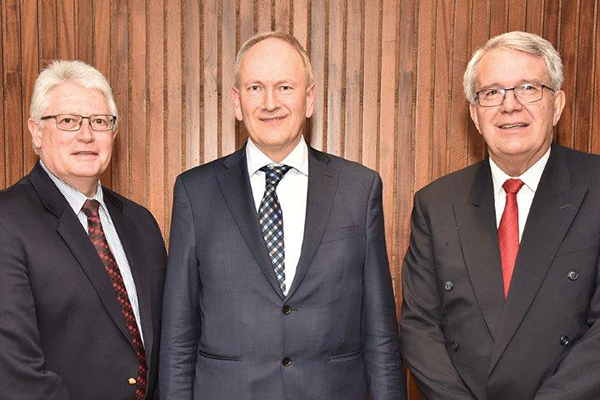Latest News Archive
Please select Category, Year, and then Month to display items
03 March 2021
|
Story Giselle Baillie
|
Photo Supplied
_web.jpg?sfvrsn=987e6620_1) Residence members who led the project, included:
Bohlokwa Rantja, the Residence Prime, and Transformation Committee members Nsuku Mutemela, Ofentse Motlakeng, Phindile Tjale, Madinku Mabala, Mmapopi Motshoso, Karabo Shuping, and Tagane Sekete.
Residence members who led the project, included:
Bohlokwa Rantja, the Residence Prime, and Transformation Committee members Nsuku Mutemela, Ofentse Motlakeng, Phindile Tjale, Madinku Mabala, Mmapopi Motshoso, Karabo Shuping, and Tagane Sekete.
The University of the Free State (UFS) Council approved and adopted Lehakwe House as the new name for the
NJ van der Merwe residence on the Bloemfontein Campus. The approval on 26 November 2020 followed a lengthy process of deliberation, consultation, and public engagement that has taken place since November 2019 and is aligned with the UFS Policy on Naming and Renaming. The name-change process was initiated by the Prime and Transformation Committee of the residence, guided by the
Unit for Institutional Change and Social Justice and supported by a multi-stakeholder committee representative of the residence, the Housing and Residence Affairs Office, the Department of Student Affairs, the Student Representative Council, and alumni.
Lehakwe – a precious gem
Following a lengthy evaluation process of the names submitted through a public voting and recommendation platform in July 2020, ‘Lehakwe’ – a Sesotho word referring to a ‘precious gem’ – emerged as the front runner. As many current and past members of the residence attest, this womxn’s residence has come to occupy a significant space within the hearts and minds of UFS students and the UFS community, given that its spirit has always been closely aligned with the constitutional values of dignity, equality, and freedom and with the human values of ubuntu. In this vein, the new name of ‘Lehakwe’ presents a consolidation of constitutional and university values into the day-to-day thinking, learning, living, and legacy spaces of students, as well as everyone who interacts and engages with the UFS.
Tutu-Jonker Prestige Lecture Series tackles reconciliation
2017-11-13

Prof Rian Venter; Prof Eddy van der Borght, guest speaker from Vrije
Universiteit, Amsterdam; and Prof Fanie Snyman, Dean of the Faculty
of Theology and Religion at the UFS.
Photo: Supplied
The Faculty of Theology and Religion recently hosted the annual Tutu-Jonker Prestige Lecture Series at the Bloemfontein Campus of the University of the Free State (UFS). The purpose of the lecture series is to address modern-day and pressing social challenges from a theological and religious perspective.
With the theme Religions and reconciliation of conflicting identities, guest speaker and Desmond Tutu Chair on reconciliation at the Faculty of Theology: Vrije Universiteit Amsterdam, Prof Eddy van der Borght, spoke about the reformation in the context of shifting European identity formations.
Reconciliation versus social identity
“My focus is on what the Christian concept of reconciliation means for reconciliation in society,” said Prof Van der Borght. He deliberated the global problem of conflict generated by diverse social identities. He also emphasised that religion has huge resources to contribute towards overcoming conflicting identities.
“The theory is that religions know about reconciliation, while in practice it is much more complicated, because often religions are part of the problem of conflict,” he says. He said religions are often the problem in social cultural identities, especially regarding conflict involving different nations, racial, and ethnic groups.
Honouring prominent theologians Tutu and Jonker
The name Tutu-Jonker originates from the two theologians, Emeritus Archbishop Desmond Tutu and the late Prof Willie Jonker, who are both regarded as prominent theologians known for their emphasis on reconciliation in South Africa. The significance of combining the two names is said to bring together two different theological traditions (Anglican and Reformed), cultural groups, and races.
Prof Fanie Snyman, Dean of the Faculty of Theology and Religion, said, “This will also serve the purpose of a welcoming culture at the faculty, embracing diversity and embodying reconciliation.” Both of these theologians received honorary doctorates in Theology from the UFS.